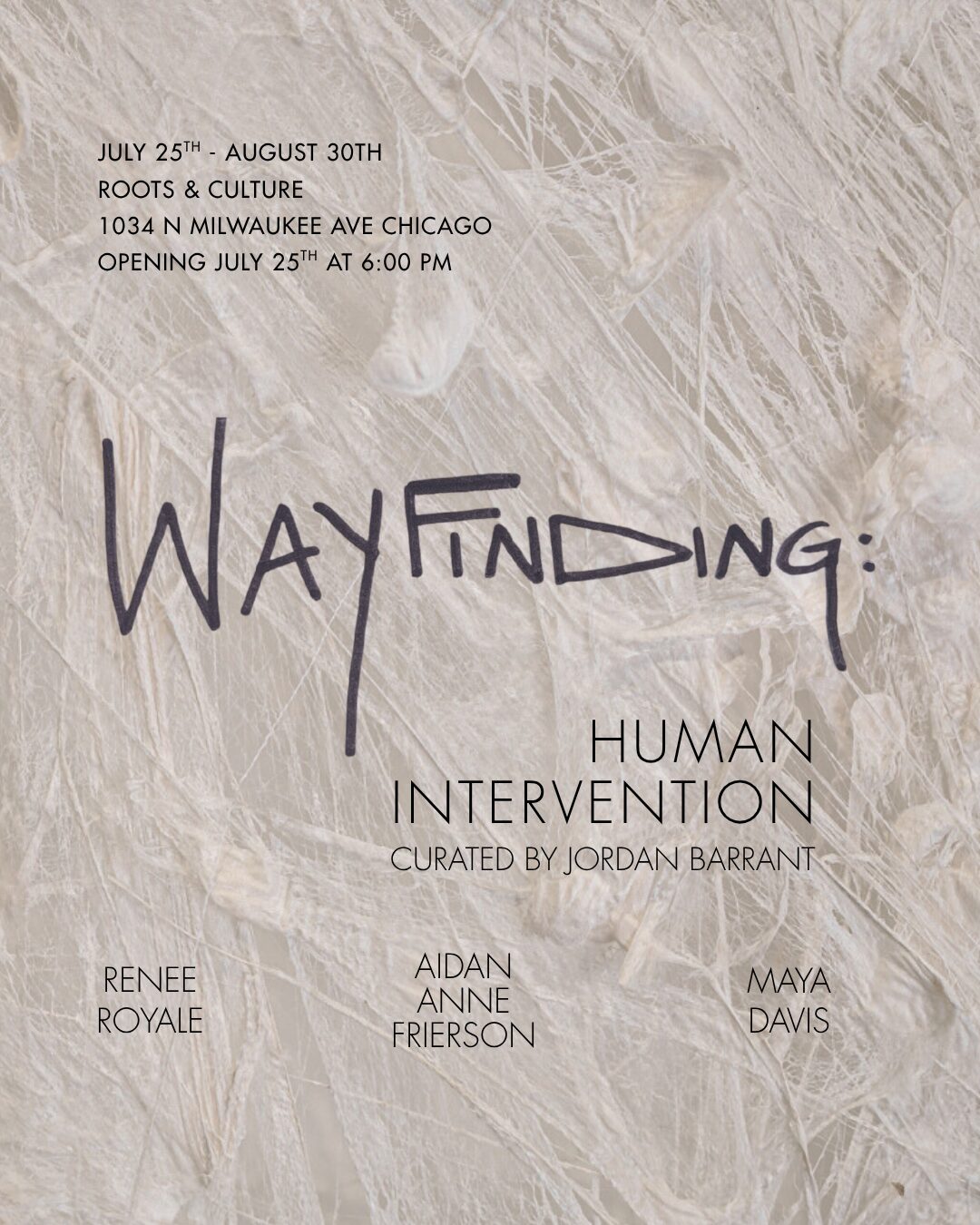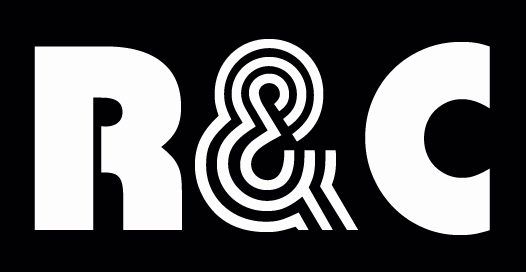
Wayfinding: Human Intervention: curated by CONNECT Curator Jordan Barrant
With Aidan Anne Frierson, Maya Davis, and Renee Royale
Opening Friday, July 25th 6–9pmIf you’ve ever found yourself lost and found your way back, you may have used a form of wayfinding. Wayfinding is a process of utilizing cues from the natural world to orient yourself, to know yourself and where you are, and to find, in conversation with yourself and the natural world, a path towards a destination.
Wayfinding: Human Intervention, curated by Jordan Barrant as part of the Roots & Culture CONNECT Residency, looks at three artists employing methodologies of wayfinding through a response to colonial interventions and the creation of their own. The exhibition features Renee Royale (b. 1990), a research-based and process-oriented visual artist based in New Orleans and Chicago; Aidan Anne Frierson (b. 1998), a Chicago-based papermaker; and Maya Davis (b. 1999), a Detroit-based multidisciplinary artist. Rooted at the intersection of Black Geographies and Feminist Ecologies, this exhibition looks to theorists Katherine McKittrick and Anna Tsing to understand how artists respond to the historical and ongoing interventions by colonial enterprises into our natural world, and how they, in response and in conversation with it, create their own material-based interventions.
The exhibition also considers concepts of humanness as articulated by Sylvia Wynter and the dehumanizing of Black, Brown, and Indigenous communities. It suggests that, potentially, for those communities, those that commune with the land are finding ways towards newer versions of humans, ones that operate in cohesion with other lifeforms. Each artist in this exhibition presents their own form of wayfinding, both in their work and life, searching for paths through their conversations with their surrounding landscape, submergences into the environments, and interventions through their varied practices, and thus, assertions of humanness.
Accompanying the exhibition, a short publication with the same name will be published, featuring essays from the curator Jordan Barrant, writer Talia Wright, and art conservator Tempe Stewart. The zine will comprise essays dissecting the concept of wayfinding and the human interventions the artists embark on. The zine will be made available August 15 and will be published digitally on August 10 during the Submerging at the Site event.
The exhibition will feature three events, a virtual Co – Facilitated Q & A with the artists, curator and zine writers on August 10th, a Curatorial Walk through on August 17th and a Papermaking Workshop on August 24th.
Aidan Anne Frierson (b. 1998, Chicago, IL) is an Artist and Educator from Chicago primarily practicing Handmade Papermaking. Her practice prioritizes Cotton, emphatically positing the material as “the reason Why We Are Here”. Through Handmade Papermaking, she activates material by engaging with color, texture, size, pattern and form. She honors history as a material by embedding ephemera in relationship with cellulose. Frierson’s work is a culmination––a form––of material storytelling and diaristic cartography, that reflect memory’s interdependent relationship with reality.
Frierson is the Executive Director of the North American Hand Papermakers, and her public programming, education work, and cultural practice has shown up collaboratively in spaces such as: Hyde Park Art Center, Chicago Public Schools, Dieu Donné Papermill, Hook Pottery & Paper, Smart Museum of Art, and Penland School of Craft.
RENEE ROYALE (b. 1990, Brooklyn, NY) is a research-based and process-oriented visual artist whose practice operates at the intersections of media, philosophy, and ecology. Her work bears witness to how film-based artworks and artifacts contribute to and are permanently altered by engagement with ecological degradation and colonial histories. By foregrounding media materiality and its entanglement with ecological systems, she addresses broader questions about temporality, belonging, and the legacies of Black ecologies.
Her art has been featured in publications including liquid blackness, SEEING BLACK: Photography in New Orleans 1840 and Beyond, A Nation Takes Place: Navigating Race and Water in Contemporary Art, and an artist’s book, Landscapes of Matter. She has exhibited work at various institutions including the Minnesota Marine Art Museum, Winona, MN; Contemporary Arts Center, New Orleans, LA; Louisiana State University, Baton Rouge, LA; Macalester College, St Paul, MN; Echo Contemporary, Atlanta, GA; Tulane University, New Orleans, LA; Antenna Gallery, New Orleans, LA; and ICOSA Gallery, Austin, TX.
Maya Davis’s (b. 1999, Lansing, Michigan) artistic practice explores the interconnected concepts of care, preservation, and resilience through diverse media and processes. They examine care as both an intimate act and a collective responsibility, drawing parallels between human experiences and natural systems. Central to their work is an investigation of transformation and endurance, particularly through materials that embody cyclical patterns of damage and repair. Through research-based approaches, Davis cultivates and transforms organic materials, creating works that embody histories of adaptation and survival. Their practice examines complex relationships between colonization, displacement, and belonging that shape both communities and ecosystems. By interweaving biological, historical, and personal narratives, Davis invites reflection on our collective responsibility to nurture shared environments and the human capacity for adaptation within a world marked by both trauma and healing.
Davis has participated in residencies and fellowships with organizations such as Independent Curators International, Modern Ancient Brown, and Bulk Space. Their work has been featured in galleries including Good Weather (Chicago), White Columns (New York), and the Museum of Contemporary Art Detroit. Davis has received support from organizations such as Culture Source (ARC Fellow), Red Bull Arts (Detroit Mini-grant Recipient), MdW Coalition (Artist Organizer Fellow), and Petty Propolis (Visionary Resistance Fellow).
Jordan Barrant (b. 2000, Boston, MA) is a Chicago-based writer, curator, and interdisciplinary artist whose work explores the cosmological intersections of the ineffable, the American South and the Caribbean, with a focus on land-based and intuitive practices. Through oral histories and archival research, Jordan views the past as an invitation to imagine brighter, more loving futures.
She received her bachelors from Spelman College in the Women’s Studies and Art History Department and her Masters from the School of the Art Institute of Chicago in the Visual and Critical Studies department. She was the co-curator of The Black Domestic at SITE Galleries. She has participated in an Artpace San Antonio Curatorial Residency, a Chicago Artist Coalition Curatorial Residency and the New Local Space Kingston Residency and has received fellowships from the Pulitzer Center and the Fulbright Program. Her writing has been published in Burnaway, the Chicago Reader, the Boston Art Review, Sixty Inches from Center and the Black Embodiments Studio: A Year in Black Art.
